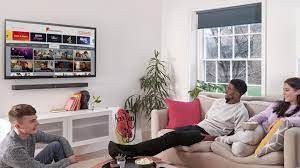Survey: Brits value video quality
May 10, 2022
By Colin Mann

Findings from the annual State of the Nation national TV trends survey from the Digital TV Group (DTG), the centre for UK digital TV, suggest that quality matters for an increasingly discerning consumer when it comes to resolution, audio quality and content.
Consumers now expect all SVoDs and BVoDs to be available across all devices and would use this as a selection criterion when buying a new TV. However, energy efficiency and running costs have moved to second place in the priority list, driven more by the cost-of-living crisis than sustainability.
Appetite, and a preference, for British content is high despite the penetration of international streamers, and almost three-quarters thought access to free national television was important (though younger demographics were less likely to say so).
“The DTG annual State of the Nation research will focus our work with industry in this critical year as we respond to the government’s vision for the future of broadcasting in the UK,” advises DTG Chief Executive Richard Lindsay-Davies. “Together, we have a unique opportunity to address viewer needs and pain points and build a pathway to a vibrant market into the 2030s.”
Findings at a glance:
Who is watching what?
- Strong broadcaster VoD (BVoD) and subscription VoD (SVoD) uptake is driving viewing of IP-delivered full-length TV programming; both have close to 80 per cent monthly adoption.
- However, free live TV channels is still the leading ‘go-to’ way to watch television programmes in the UK, with 30 per cent of UK consumers saying this is their primary way to watch.
- One in four consumers watch free ‘new wave AVoD’ services such as Rakuten TV or Samsung TV Plus at least once a month.
- Inconsistent audio levels are a key and growing source of annoyance. 39 per cent are interested in technology that would enable clearer audio when watching TV. The use of subtitles has also increased over the past year, from 40 per cent to 44 per cent, driven by SVoD users.
- This year’s report also suggests a shift in attitude towards watching content in the highest resolution possible. Only one-third say watching in this way doesn’t matter, compared with 47 per cent a year ago. However, only 24 per cent are currently interested in watching 8K content on their TV.
Brits back British
- Despite the prevalence and impact of global video services providers, significantly more UK consumers prefer British TV shows over US/international TV shows, partly justifying the 29 per cent increase in investment in UK high-end TV shows and movies in 2021 compared with 2019.
- In addition, 71 per cent of UK consumers agree that it is important everyone in the UK has access to free, national television in the future, although only 54 per cent of 16-24s agree with this.
Buying behaviour
- Energy efficiency has emerged as a key consideration for TV buyers. It is now the second most desired feature considered when buying a TV, behind Smart connectivity and ahead of 4K UHD.
- However, there has been a fall in those who would consider streaming at a lower quality to reduce emissions; just one in four would now, down from 40 per cent a year ago.
- Interestingly, since last year’s survey, respondents say the importance of a TV being pre-installed with SVoD apps has overtaken the importance of BVoD apps being pre-installed.
- Many consumers remain cautious about the integration of cameras and microphones in their TV; 41 per cent of UK consumers don’t want these in their TV set, just 22 per cent do, with privacy concerns paramount.
- Only 14 per cent of TV owners are confident of how to ensure their Connected TV is safe from a cyber-attack, falling to just 4 per cent of over 65s. The introduction of a security certification programme would be welcomed by consumers, with 45 per cent of UK consumers more likely to buy a TV with an official certificate for high-security standards over one that doesn’t.
- The long-term move towards the metaverse is inevitable, but current consumer understanding of it, and what applications it could be used for, are low. 64 per cent of UK consumers have heard of the metaverse, but most of those aware don’t know what it is and only 7 per cent have used a metaverse application.
- Watching TV is the most cited application consumers think they will undertake in the metaverse in the future, although only one in five say they will do this, highlighting confusion over potential use cases and adoption.
